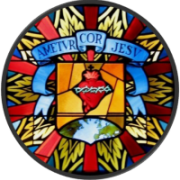Let us look back on where we have gone while exploring the response phase of our spiritual voyage. In the first cardinal contemplation, we witnessed the Sacred Heart event through the eyes of the beloved disciples John and Magdalene. In the second, we joined Andre Coindre and Xavier in their contemplation of boys languishing in the prison-hospice of l’Antiquaille.
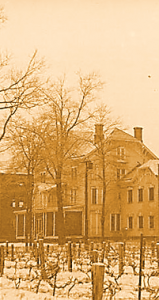 This third contemplation affords us a vantage point from a front porch where we will witness new occupants—among them Brothers Stanislaus and Fabian and some high-school aged American recruits—settling into a roomy three-story farmhouse. It commands a surrounding view of a carriage house, a stable, a large shed for drying tobacco, and other dependencies needed to service a fertile seventy-five acre farm and make a home for a formal canonical novitiate and house of studies.
This third contemplation affords us a vantage point from a front porch where we will witness new occupants—among them Brothers Stanislaus and Fabian and some high-school aged American recruits—settling into a roomy three-story farmhouse. It commands a surrounding view of a carriage house, a stable, a large shed for drying tobacco, and other dependencies needed to service a fertile seventy-five acre farm and make a home for a formal canonical novitiate and house of studies.
Thirty miles southwest of New York in New Jersey, Metuchen in 1900 is a town of fewer than 1,000 souls. The brothers’ American colony, as it was known in France, is newly divided into two provinces—Canada and the United States. Canada has a well-stocked novitiate. Since closing the novitiate in Indianapolis, the US has no novices. The Metuchen purchase, meant for a novitiate and formation center, is in a site well-suited to the needs of a new province hoping to grow, since it is near a center of Catholic population. With this acquisition and growing interest from potential recruits, the brothers “are enthusiastically facing the rising sun of success.”[1] On a snowy day in November 1902, ten postulants take the habit, and the new novitiate of the new US province is off and running!
Exiled French Brothers
During spring of that first novitiate year, the growing Metuchen formation community celebrates a welcome windfall. Its tale must be told as a fourth voyage foundational to our spirituality.[2] During the days when the Masonic French government was systematically shutting down the freedom of Catholic education, the so-called “law of the associations” was passed in 1901. It informed religious congregations that they could no longer continue to exist in France without express official recognition. The law was applied with unheard-of rigor, and any request for authorization was rejected without appeal. The brothers, then, had only two alternatives: to leave France in exile or to abandon their vocation and run secular schools belonging to the state. Brother Albertinus, teacher at the novitiate of Paradis at the age of 23, didn’t hesitate an instant: “I will take leave of France and save my vocation.”
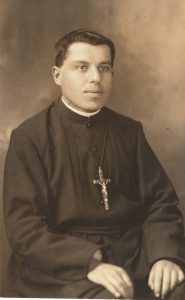
At the beginning of 1903, the French government ordered the brothers to vacate Paradis. Shortly afterwards came the dreaded visit of the process-server to take inventory in preparation for a public liquidation auction. Brother Austin, a postulant at the time, fills in some interesting details: “We had hurriedly removed a good part of the furniture, which we hid in barns belonging to our friends in town. The most difficult thing to save were the pews from the chapel; they were made of solid walnut. The boarding students were sent home. A number of postulants and novices had already returned to their families since their parents would never consider letting them be exiled. The rest of us, about twenty, were placed in the charge of Brother Albertinus to get ready for our exile to America. With the departure date close, we were given permission to go bid farewell to our parents and friends; most of our families lived in the region. Albertinus himself went to his family home in Haute Loire.
“It was quite natural that his family would use any stratagem they could to dissuade him from leaving France,” Austin wrote. “‘It’s just too sad,’ kept repeating his sister Augustine, ‘to see you leave us just like that.’ Everyone was telling him, ‘You’ll easily find a place here; stay with us.’ But all of those efforts, instead of unsettling him, made him laugh, he later told his sister. His response to the urgent pleas from his own flesh and blood was, ‘The boys who are leaving with me have absolutely no hesitation about sacrificing everything. I’m like their father, so I must set an example and be a model.’ And he returned resolutely to Paradis.
“After we returned,” continues Brother Austin, “we took off our cassocks and put on secular clothes that someone bought for us in Le Puy. We were all dressed in different colors, black being predominant. Brother Albertinus wore a gray suit in which he seemed to be drowning. Everyone knows that he had no clue about how to buy clothes, then or later. Pretty soon Brother Basilien arrived with a group of postulants and some brothers. The twenty-eight of them were destined for Canada. We were going to the Metuchen house of formation in the United States. Each group was under the direction of its respective leader, Albertinus or Basilien. Those of us going to Metuchen were eight postulants, six novices, two scholastics, and two young brothers.
“We were to depart from Le Havre March 21 [1903]. We took the train from Le Puy to Paris, where we stayed two days in the brothers’ school there. We visited the city and made a pilgrimage to Montmartre. The basilica was still under construction and the giant twenty-one ton bell was waiting to be lifted into its steeple.
“Brother Albertinus stayed with our group even though he had a cousin in Paris who was very close to him and whom he would very much have liked to visit. Later he received a letter from that cousin saying, ‘I would have loved to see you, but I understand your reasons perfectly. You’re at the head of column of refugees like a true Moses leading his people across the desert to the Promised Land to escape the wrath of Pharaoh. You, dear cousin, have escaped the hatred of people who are more evil than Pharaoh. I understand very well that you would not have been able to abandon your fellow exiles.’”
Brother Austin continues: “After our visit to Paris, we took the train for Le Havre and boarded the steamer La Champagne, a vessel which, next to the
United States or the Queen, seemed tiny, and had no chance of winning the blue ribbon in a race across the ocean. It was going to take us nine days to reach New York.

“Since there was almost no one in first class, the captain upgraded us even though we had only second-class tickets. We had a good start; very few people suffered from seasickness, and Brother Albertinus put on a charming demeanor during the whole crossing, letting no one see his pain at being deported into exile. As for us, we were young. The distractions of the voyage, along with our eagerness to see what was waiting for us, made us forget that we were being banished.
“At the beginning, the sea was calm, but the third day it raged. Waves swept over the ship’s bridge constantly so that we had to stay locked inside. Many passengers were affected by seasickness, chief among them Brother Albertinus, who was heaving greatly. Happily, that didn’t last too long and we regained calm. On March 31, we finally docked at New York, where Brother Stanislaus of the US province was waiting to drive us to Metuchen.”
Right away, the young Frenchmen began studying the English language under the direction of Brother Osmond, the provincial. He was the most demanding of professors, but his students as a result made quick progress. From the outset, the newly-arrived exiles mixed well enough with the American postulants and novices. Brother Albertinus served as their master and director, as this excerpt of a letter from the superior general indicates: “I don’t need to tell you how much I am counting on you and on your devotedness to accomplish the mission I proposed to you by entrusting this group of young men to your care. Make these brave teenagers into valuable helpers for our United States Province.”
From the beginning, Brother Albertinus lent himself generously to the task of formation director and didn’t hold anything back in making life agreeable within his group and among the young American postulants and novices.
He noticed quickly how poor the house was and how the chapel in particular left a lot to be desired. In his first letter to France, he asked for help to improve the situation. “I would like to thank you,” he wrote later to Brother Albéric in France, “for all of your generosity towards Metuchen. The liturgical vestments and other linens that you had the kindness to send have given great pleasure to the brothers. Our joy is only equaled by the poverty of our chapel. All, especially the Frenchmen, were extremely pleased to see such beautiful chasubles. Last Sunday, on the feast of St. Irenaeus, our chaplain wore the red one with its beautiful emblem of the Sacred Heart. When he entered the chapel, faces were beaming. Personally I regard these vestments as precious relics.” And Albertinus who, like the Curé of Ars, had a pronounced taste for the dignity of the liturgy, kept requesting more from his confrères in France and didn’t hide his satisfaction at seeing his requests rewarded with success.
Brother Albertinus Juge
On August 15, 1903, Brother Albertinus, in the Metuchen chapel he was trying to beautify, made his perpetual vows of poverty, chastity, and obedience before the US provincial. It was an unforgettable day; he would speak often about it throughout his life. He was the first brother to make final vows in the house of formation in Metuchen.
During his long stay at the novitiate, Albertinus played the organ and directed singing in the chapel. On one occasion during Mass on a national holiday, he tried to show his good will to the American patriots by playing a novel interlude: several measures of Gershwin’s Swanee River! As you can well imagine, the American teenagers recognized the melody right away and couldn’t hold their laughter to a snicker. They lost it, but fully enjoyed the opportunity to tease him on the way out of the chapel. His defense? That he was playing a “Negro spiritual.”
Albertinus, after three years of teaching in the South, became novice teacher and then novice master. He would not leave Metuchen until ten years later, when he became provincial. He liked preparing and directing liturgical music, and his students responded well. On feast days, the singing was both very accomplished and moving.
He worked alongside the postulants and novices in outdoor upkeep of the property. The farmyard was his favorite place to work with them, especially the henhouse. During an epidemic that was ravaging the chicken coops, they worked day and night treating more than 300 hens, which they succeeded in saving.
He was a tireless walker. And he never passed up an occasion to accompany his students in the thrice-weekly hikes and the three annual foot races that were part of Metuchen tradition: the feasts of St. Stanislaus, of Easter Monday, and the 4th of July picnic. During outings, he was full of energy and good humor. His notorious curiosity led him to explore places that were least known. The farmers who saw him coming with his troupe sometimes made war with him, fearing for their produce. But somehow he always arrived at pacifying them and often at making good friends of them by offering to supply novices and postulants to give them a helping hand in times when harvest was urgent. He was also first in line for excursions to pick wild fruit and berries, from which he always returned with impressive baskets of booty.
As master of novices he was also in charge of the professed brothers in the house. He regularly had interviews with the young men in formation, and he was also conscientious about spending time listening to the older brothers. He consecrated all the time they needed for each one to share with him their difficulties and their complaints. He listened sympathetically and offered sound counsel. It is not always an easy thing to keep the peace among the various members of communities in large houses like Metuchen. Nevertheless, Albertinus had a knack for it.
Any visitors who came to Metuchen were sure to be the object of his thoughtful attentions, because he was always extremely hospitable. He personally made sure that lemonade or coffee was served if it was a short visit, or a full meal if it was longer. Because of him, the priests of the parish were friends and benefactors of the house. Each week he made sure that someone brought them the best vegetables from his garden and the nicest looking eggs from the community farmyard. The local doctor, the hospital authorities, and numerous different benefactors were never overlooked by the largesse of good Brother Albertinus.
The war years from 1914 to 1918 passed peacefully enough at Metuchen. All the same, at the beginning some heated arguments threatened to drive the brothers apart. Albertinus, who was at his best in managing difficult situations, convinced the brothers and those in formation to avoid speaking of the partisan controversies of the war, which most did judiciously for the sake of peace in the community.
Centennial Celebration
The year 1921 marked the centennial of the foundation of the Institute. The brothers had a gala private celebration at the novitiate on the feast of the Sacred Heart. On the following Sunday, Church dignitaries from far and wide came to the parish to join the brothers in celebrating the glorious centenary of the Institute. You can be sure that Albertinus, working months in advance, had assured that the young brothers in formation would be up to their outstanding best in chant under the direction of their enthusiastic choirmaster.[3]
The Brothers wanted to build a worthy chapel as a memorial of the centennial. In 1922, thanks to a successful fund drive, a spacious chapel with marble statues was completed. Its joyful dedication coincided with the arrival of the solemn news that Albertinus’ ten-year term as director of novices had to come to an end because the superior general named him provincial of the United States.
Of that news, Brother Macarius, provincial councilor, noted, “The young brothers, his former novices, were delighted at his appointment. They were very grateful to him for their training in solid piety, serious character, and great devotion to the Institute. They loved and revered him and felt that, now that he was provincial, they would again benefit from his cherished care.”[4]
The story of Albertinus’ exile, leadership at Metuchen, and foundational influence on the spirit and spirituality of the US province is a critical—even legendary—stage in our province’s spiritual voyage. After growing up on the farm at Metuchen, his stature increased when he spread his wings in the wider Institute. He served two terms as provincial. Then, in 1931 he was elected to the general council headquartered in Spanish Basque country. Six years later, the general chapter chose him for the office of Superior General, which he fulfilled with charisma and stamina during the most trying of times. His fifteen years at the head of the Institute coincided with the era of the Spanish civil war and World War II.
Prophet of the Mystical Body
Line 8 of our map is Brother Maurice’s acknowledgement of the decisive mark that Brother Albertinus made on our spirituality. The phrase “a personal vocation in the Mystical Body” is a direct echo of both the central spiritual doctrine which Albertinus developed in his circular letters and of his own personal identity. He was inspired by St. John Eudes and the French school of spirituality, which influenced an encyclical of Pope Pius XII, [5] written some years later. All of his circulars formed a series on the spirituality of the Mystical Body, a theme very precious to him, and a theme to which he grafted our religious and apostolic life. He was the only superior general to adopt for his circulars an overall plan and a spiritual vision that was both theological and practical. His is a remarkable synthesis which we would do well to integrate into our present search to express our spirituality for a new century.
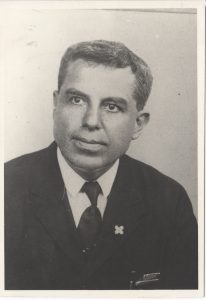
Our map makes allusion to Brother Albertinus’ spiritual keystone in article 3: “With all men and women we are called to holiness in keeping with a personal vocation in the Mystical Body.” The Rule evokes the Mystical Body again in the chapter on the Sacred Heart—this time not in relation to our holiness but to our participation in its sufferings.[6]
Albertinus expressed his keen spiritual awareness of being mystically attached to the risen Body of Christ not just by his written and spoken words—which were profuse—but by the story of his life.[7] Let us contemplate both.
Albertinus wanted us to understand that we incarnate the post-resurrection body of Christ. We are a spiritual extension of Christ’s risen body.
With him we contemplate our divinely-given communion in Christ: “By a divine, ineffable bond we are united with each other and with the Divine Head of the whole Body.” The key insight from Brother Albertinus in line 8 is that Christ has need of us as his members. He needs us to both pray and act in the world. This is a deep mystery and an inexhaustible subject of meditation: Jesus’ salvation of young people depends on the prayers and actions which we, as members of his mystical body, offer.
Because of our mystical union in Christ, our recent provincial chapter had every right to say that we are the compassionate heart of Jesus, as the branches are the vine. John Chrysostom is not afraid to be bold about our radical identification with Christ: “Christ is the head, we are the body. … He is the foundation stone, we are the building; he is the vineyard, we are the wine; he is the groom, we are the bride; he is the shepherd, we are the sheep; he is the way, we are the travelers. We are also the temple, he is the resident; he is the first-born, we are the sisters and brothers; he is the heir, we are the co-heirs; he is the life, we are the living; he is the resurrection, we are the risen; he is the light, we are the enlightened.”[8]
A Second Exile
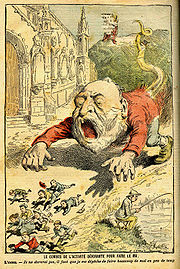
The exile of religious congregations from France was the final solution of the masonic government, after onerous laws of regulation, taxation,
persecution, and mandatory military service failed to break the congregations’ resolve to perpetuate education based on faith. Over fifty orders in France were dissolved and their properties, including churches, confiscated. About 30,000 religious men and women fled the country in exile,[9] so Brother Albertinus and his group of twenty who boarded La Champagne in 1903 were a microcosm of a multi-directional caravan of religious educators who chose their vocation over their homeland.
His fifteen years at the head of the Institute coincided with the demoralizing Spanish civil war and World War II, during which the general council was marooned in Paradis. In France and Italy, fighting was carried on with all the bitterness of despair. Many young French brothers were interned in Germany; France was occupied; fifty French brothers died during the war. Nazi officers headquartered themselves in our buildings in Paradis. Communications with the Institute were stifled. Discouragement reigned.
Being unable to travel, Albertinus was ironically exiled within his native France. This second exile cut him off from the brothers on four continents whom he was called to hearten and unite. It was only in 1942 that he contrived to make his way across the Atlantic to relieve the anxiety of the North American brothers as well as those in South America.
Prophetic vocation
The letter he had received back in 1903 at the outset of his first exile comes back to mind: “You are a true Moses … .” Weren’t those words written by a cousin calling him a prophet, ultimately a call from God?
When he announced, “I will take leave of France and save my vocation,” it was not so much his state of life that was imperiled. It was his identity as a prophet. The French Third Republic was exiling teaching congregations because they were dangerous to its values, most importantly Church-state separation and the government’s desire to run a school system based on secular republican tenets. Albertinus could not conceive of purging from education all that had to do with faith. He could not see himself as an instructor in a faithless school or as a promoter of secular culture. He would resist–and rail against–exiling God and spiritual formation from the school.
In contemplating Albertinus as prophet at the end of the first century of our Institute, we have much to consider about heightening our spiritual identity as prophets at the end of the second.
The single ordinance of the general chapter of 2012 was a call from God for us to be prophets:
“That the whole Institute—brothers, local communities, partners in mission, and educational teams—commit itself with renewed determination and in a spirit of ongoing conversion, to highlight the prophetic dimension of its mission.”[10]
Here, in a reflection about our spirituality, is not the place to explore practical decisions for living that ordinance in our mission; the chapter led a special discernment process to that end. This is the place, however, to consider the gifts of faith and prayer we must implore to be able to imagine and accept our prophetic vocation. The chapter said that our mission will be prophetic only to the extent that it flows from a deep experience of God and from the perception that God is truly near to us.[11]
Theologian of the Mystical Body of Christ
Fortunately, we have Brother Albertinus to help us understand what it means to be prophetic. Seeking a message that would bring consolation and unity to the Institute during fractured and chaotic times, he drew from St. John Eudes and the French school of spirituality in order to spread in the Institute the rich theology of the Mystical Body of Christ.
There are two pillars of that theology that can help us acquire a prophetic spirituality.
The first is that we, in all our diversity, are the one Christ. Albertinus wanted us to understand that, in the wondrous variety of gifts within the institute and Church, we incarnate the post-resurrection body of Christ. We are a spiritual extension of Christ’s risen body: “By a divine, ineffable bond we are united with each other and with the Divine Head of the whole Body.”
He is fascinated with the realization that Christ has need of us as his members praying and acting in the world. Christ is risen into us; outside of us there is no risen Christ. This is a deep mystery and an inexhaustible subject of meditation. Jesus’ salvation of young people depends on the prayers and gestures which we, as his diversified members, offer.
The very point of the image of the Mystical Body is that it reveals God’s plan to unify incredible diversity into one. Welcoming such diversity into the inner circle of the adult mission teams throughout the Institute is an essential element of our spirituality. Our Institute has one mission: evangelization through the education of children and youth.[12] During Albertinus’ time, that mission was almost exclusively the responsibility of brothers. Today, however, responsibility for our mission is shared by a mystical body of adults of many states of life and religious affiliation. Incorporation into the Mystical Body of Christ means that all are included not just in a common mission, but also in a common spiritual identity.
Albertinus found prophetic courage to separate himself from his country when it veered from the gospel. Beyond our mission to the young, his example calls us in our adult lives as citizens to place evangelism ahead of patriotism. We engage in the political dialogue of our nation as voices of Gospel values rather than as members of a political party or movement. Our first citizenship is our belonging to the Body of Christ. Albertinus’ example also calls us to resist the false values of secularism and consumer-driven materialism that is so powerful in our democracies.
Besides unity as the Body of Christ, there is a second pillar that Albertinus pondered in his circulars. It is that each of us is conformed to Christ in the way our physical members as well as our mind, heart, and will are intrinsic to us; they don’t act independently of us. Albertinus’ spiritual doctrine is that we are intrinsically Christ,
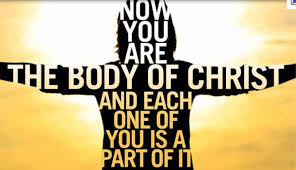 who doesn’t act independently of us. Christ doesn’t feel compassion except through us; his body on earth is our bodies. An Irish Dominican, Donagh O’Shea, expresses this truth in a very simple sentence: “When Jesus says ‘I’ we are somehow in the picture too.”
who doesn’t act independently of us. Christ doesn’t feel compassion except through us; his body on earth is our bodies. An Irish Dominican, Donagh O’Shea, expresses this truth in a very simple sentence: “When Jesus says ‘I’ we are somehow in the picture too.”
Of which part of the Body are we members? Jesus was known throughout his life as a prophet.[13] The essence of a prophet is to feel and to speak for God. As prophets, our spirituality of the Sacred Heart connects us to the emotional life of God enfleshed in Jesus, now risen and abiding in our hearts.
Taking that perspective means that when we pray we shouldn’t cinematically imagine ourselves walking alongside or behind Jesus. Or adoring him as a separate or distant being. Or as alternately entering and leaving his presence. Instead, we want to feel ourselves caught up in the very mystery of being the heart of the risen Christ.
The kind of prophetic prayer the general chapter of 2012 proposes is one “born of the nearness of a God full of compassion, who undergoes a passion with his suffering children and who suffers because of their distance from him.”[14] To pray as authentic disciples of the Sacred Heart, members of the Body of Christ connected to God at the heart, we need to pray for a prophetic consciousness that can enable us to feel as God feels. We want the sentiments of Jesus’ heart to inhabit our heart. Action comes after that. We must first become living, resonant members of the Body of Christ. To that end we pray to become prophets feeling the compassion and the passion that moved Jesus to weep over Jerusalem[15] and to heap woe on those who give scandal to children.[16]
13
Metuchen
Brother Albertinus
Reflection, Reading, Exchange
The Grace I Seek …
Lord, you gave Brother Albertinus a lively sense of being a vital member of your risen Body. I’m not there yet, Lord. When I hear talk of the Mystical Body, it feels far away and hard to grasp. I’m not looking for a definition, but I do long for hopeful assurance that somehow it involves your empowering me.
Breathe into me an awareness that your Being suffuses mine, that I exist in you. Give me a sense that your Spirit and your suffering penetrate mine the way powerful music fills my soul. Lord, you know what I’m asking; you said, “I and the Father are one.” Give me a similar deep-seated conviction that my true home is in you with those you have drawn into your heart.
An Act of Faith We are many Parts by Marty Haugen
The Prayer of Being The Practice of Centering Prayer
Brother Albertinus called us to a deeply spiritual response to the risen Christ, one whereby we intentionally identify ourselves as members of his mystical body to the point where we merge ourselves with his continual prayer and action. A practice of prayer ideally suited to connect our heart with his is the prayer of centering, is less a prayer of talking with God than a prayer of being in God.
Two of the most prominent and credible mentors of this form of prayer, are Trappist Father Thomas Keating [RIP 2019] and Franciscan Father Richard Rohr. They explain its contemplative dimension and give witness to its value as a prayer uniting our being to the one body of Christ.
Thomas Keating, O.Cist.
Part 1 introduction
Father Keating suggests that we place a simple two-word prayer in our hearts. To sense our being in communion with God and being the compassion of Jesus, two syllables in keeping with our spirituality could be “We Are.” They evoke and deepen the title of Brother Maurice’s circular — We are present to them in the Heart of Christ — as well as those of Brother Albertinus — We are the Body of Christ.
Part 2 follow-up
http://contemplativeview.com/centering_prayer/ Network website
20-minute music videos as background for Prayer of Centering
A. Harp and Nature
B. Harp & Flute
C. Nature
Comments on Prayer of Centering / Being
Richard Rohr, OFM
[Ignore the “Sorry” message. Click “Watch on Vimeo”]
Richard Rohr on Another Way of Knowing Prayer from CAC on Vimeo.
Further Meditation on Our Being the Mystical Body
A. Prayerful reading of a Circular of Brother Albertinus (1938) (Introduction) Translation: Bernard Couvillion, SC
- Pray for a deeper understanding of belonging to the Body of Christ.
- Read this excerpt from Brother Albertinus’ circular and compare it to the text of Saint John Eudes [below] which inspired it. Copy from it lines or exhortations which bear further prayer and reflection on your being and acting as a member of the apostolic body of Christ.
My very dear brothers,
There are truths, perspectives, and doctrines in the domain of the spiritual life which we can ignore without terribly impairing our spiritual growth. However, for us who know the insatiable and mysterious desire of Jesus to unite himself intimately to each one of our souls, there is one doctrine which we cannot skirt around without blocking ourselves and others from achieving that union, so powerful is the potential it holds for us.
If you ask me why it could be important to attach ourselves to a doctrine, I would remind you that always and in all things, the rule of cause and effect applies: knowledge awakens desire; theory informs practice; principle inspires action.
The doctrine I want us to plant deep in our hearts because it is such a source of jubilation is one of which theologians say things like “wondrous,” “the central truth,” ”the greatest mystery of our faith.” Its ultimate result is a union with the Holy Trinity — especially with Our Lord Jesus Christ—that is so intimate and so astounding that will take the almighty help of faith not to doubt it. It brings about a union that is not just external, as between the worker and her work or between the owner and his belongings, but so absolute that the only way we can speak of it is by using the words of theologians. The union it describes gives us “a real identity,” “a complete identification with our head Jesus Christ.”
You have no doubt guessed it, my dear brothers. The wonderful union I am speaking of is the result of a most alluring doctrine overflowing with infinite love, the doctrine of the Mystical Body of Christ.—
- a doctrine that does much more than propose a list of exterior practices of piety;
- a doctrine that leads to unimaginable intimacy with our divine master that radiates and matures and fills us with divine vitality as we accomplish our mission;
- a doctrine rich enough to instill fervor and fruitfulness into even our simplest actions;
- a doctrine so perfect and so important that it is a synthesis of the Gospel, the teachings of Paul and the writings of the Fathers and Doctors of the Church; it is also a guide for spiritual growth in which we can place our trust;
- a doctrine that can bring about unity in faith to the Church;
- a doctrine that has become a great support of contemporary spiritual life after a long eclipse due to heresies such as Jansenism … and the attacks of modern paganism.
It is not my intention to give a detailed exposé of this doctrine. Rather, I will insist on its practical consequences in our daily life. The following very succinct outline is designed to help us to own these consequences with firm conviction.
The Mystical Body of Christ! That expression is an attempt to translate the astonishing and indescribable intimacy of our relationship with our divine Savior. Let us not think that this expression is a novelty of modern theologians. On the contrary, they borrow it from St. Paul and the Church Fathers, who make frequent use of it.
In his remarkable discourse after the Last Supper, our Lord, as a way of helping us understand that we must be incorporated into him, uses the delightful and striking comparison of the grapevine: “I am the true vine, and you are the branches. No more than a branch can bear fruit of itself apart from the vine can you bear fruit apart from me. (John 15:1-4). Flowing from Jesus to us, who are bound together by the grace of baptism, is an interior spring that generates a burst of life even more beautiful and more mysterious than what a vine imparts to its branches, because from Christ what infuses us is more than ordinary life. It is supernatural.
Peter depicts this doctrine with the image of a spiritual temple, “of which Christ is the cornerstone and we the living stones.” (1 Peter 2: 4-5)
Most often, it is Paul’s allegory in of the human body that we are asked to ponder when we’re invited to taste the delights of our divine union with Jesus. Let us then feast on Paul’s gracious and life-giving doctrine. For him, what is the divine plan of the unfathomable love of God for us? “To bring all things in the heavens and on earth into one under Christ’s headship.” (Ephesians 1:10).
If that is God’s plan, we can see what can logically be expected of each of us as members of the mystical body whose head is Christ. Through our full and intimate union with the Son who is the unique beloved of the Father, we are blessed by the kindness and goodness of the Father, as well as with the privileges and the inheritance of the Son. Through Christ and in Christ we will be saved from sin and from condemnation and will become coheirs of the eternal kingdom.
There’s nothing more divinely logical: Of all that belongs to the head, how can each member not possess it? Yes. “Christ is One” Yes. “He and we are one single Christ.” Yes. “In the spiritual world, there is only one single being: Christ the head with his members.” Yes. We must dare to add with boldness: “God has only one beloved Son: Christ. And we have become Christ.” (Abbé Grimaud)
I am Yours — Song of Andy Grammer which we address to Christ.
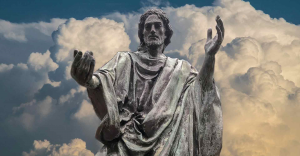
- We are the members of the mystical body of Christ, therefore it follows that:
All the mysteries of the life of Jesus from his Incarnation to his Ascension, while remaining the personal richness of our Lord, become at the same time our own richness. What could be more natural than the members becoming rich from the richness of their head? Aquinas does not hesitate to write: “The passion was shared with each member of Christ, as though he or she had endured it.”
The passion, the resurrection, and the ascension of Jesus are therefore our passion, our resurrection, our ascension! Realize, then, what a difference this consequence would make in the way we live through the whole liturgical year and with what enthusiasm we would relive it if we could see it from that perspective. - Although invisible, Jesus is forever—and cannot not be—the head of his mystical body, the Church. How could she, if separated from the head, live divine life and engender divine life in her members? But with him, the head, present, everything is assured:
— both our trust in the future and our unwavering peace during stormy times;
— our tranquil faith in the “Do not be afraid!” pronounced by our Lord in the face of the arrogance and power of our enemies;
— both the hymns we sing and the irrepressible joy we feel even in this valley of tears.
The Lord is all of those! - Belonging to Christ through the Church, we have true bonds of life with our divine head; this consequence both explains and motivates the gifts and prerogatives we have received. By baptism we are truly “incorporated” into the whole of the mystical body. Thus we share in the life-blood of Christ, and as a result, our soul enjoys divine life. After hearing those truths, are you astounded that we are called children of God, temples of the Trinity, brothers and sisters of Jesus, priests, hosts, and heirs of heaven?
- As members of Christ, we are “of Christ” and we are also “in Christ,” who continues his earthly life in us. The implications of these truths are unspeakably wonderful for us. At the same time, they charge us with an imperative: we must live from the life of Christ. Is that an obligation beyond our strength? Not at all, for our Lord himself, especially through the Eucharist, will be the motor, the center, the fire of the incomprehensible divine life within us.
- Incorporated seamlessly into the mystical body, we have the fundamental duty of being dynamic members of Christ, united indissolubly to him as our source of all true life.
What fear should we strive to arouse in ourselves wherever we are? The fear of being separated from the Head. What loathing will we constantly have to incite within ourselves? Loathing for serious sin because it ruptures the bond of union and makes us a severed branch, withered, dead, incapable of imbibing the richness of the mystical body. - As members of Christ, we must adopt the mentality of a member. Not living through herself, a member has no right to live for herself. Thus, in my life I must learn to say “no”—no to selfishness, “no” to individualism, and “no” to isolation. In their place we say “yes” to self-emptying, docility, collaboration, kindness.…
- As a member of the mystical body, I understand better the divine role of the sacraments. I know that baptism infuses me with divine life, that confirmation strengthens it, that reconciliation restores what has been lost, and that the Eucharist roots our Lord in the deepest, most intimate part of my being and nourishes abundantly that life to the point that it is no longer I who live. How precious to the members of Christ are these sacraments imagined in the heart of God!
- As a member of Christ, I perceive the mystery of suffering in the clearest and most attractive light. As a member of the crucified one, dare I be amazed at having to bear some of the weight of the cross? Do I not see, on the contrary, that it brings me honor and glory to be associated with Jesus in his suffering and death?
- From this doctrine, my devotion toward the Virgin Mary gains marvelous insight. I understand that Mary, mother of the head, cannot be a stranger to the members and that her tenderness for us is the extension of her maternal love for Jesus. …
- The Church, the mystical body and the spouse of Christ, appears greater and more lovable because of its close union with the Lord. I see that she gives back to those who place their trust in her. Her history, her glory, her joys, sorrows, her losses, the persecutions she endures of the name of Christ are all those of Christ, and must arouse in me a more heartfelt and devoted attachment. …
- As a member of the mystical body. I grasp the logic and the necessity of outreach to the needy, of the missionary spirit, of zeal for the Christian education of children, of the apostolate in all its forms. Those are the natural fruits of baptism and our union with Jesus, our Savior. I must interest myself in seeing to it that the mystical body arrives at her plenitude and lives a rich and abundant life. I must gain new members for her. I must be a disciple.
- As a member of the mystical body, I must honor those among her members who have already reached the blessedness of heaven, imitate their virtues and invoke their intercession.
There you have it, my dear brothers: the doctrine of the mystical body is the foundation of all Christian life, of our spiritual ascent, and of our apostolate, in a word, of everything related to our spirituality and the salvation of our neighbor. Filled with affection and gratitude for you, I invite you to make it the pearl and the hidden treasure of your meditation. At first, it might seem a fruit too high to reach, but the more bitter the rind is as it protects its ripening fruit and seed, the more succulent will it prove to be to your taste.
Christ today is living, is acting, is fighting, is suffering … and is triumphing in the members of his mystical body. But for the triumph to arrive, we have to communicate and share in the life of Christ through our faith and through our works: “I am the vine, you are the branches.” The more closely we are united to our divine head, the greater will be our participation in his life and more effective will be the gestures we make on behalf of our neighbor.
B. Saint John Eudes of the French School of Spirituality which influenced Brother Albertinus: The Mystical Body[18]
Our Lord Jesus Christ is your true Head, and that you are one of His members, and that from that fact there flow five important results:
- That He stands to you as the head to its members, so that everything in Him is yours, His spirit, His heart, His body, His mind, and that you must make use of them as your own for the purpose of serving, praising, loving and glorifying God.
- That you stand to Him as do the members to the head, for which reason He ardently desires to make use of all that is in you for the service and the glory of His Father, as of things that are His own.
- That not only does he so stand in regard to you, but also He wishes to be in you, to be living and reigning within you, as the head lives and reigns in its members; and that He desires all that is in Him to live and reign in you: that His mind should live and reign in your mind, that His heart should live and reign in your heart, that all the powers of His soul, all His interior and exterior senses and all His passions should live and reign in the faculties of your soul, in your interior and exterior senses, and in your passions, so that . . . the life of Jesus may visibly appear even in your flesh and in your external deportment.
- That not only do you stand in a particular relationship to the Son of God, but that you must be in Him, as the members are in their head, that all that is in you must be incorporated in Him and receive life and direction from Him, that there is no true life for you save only in Him alone . . . that outside Him there is only death and perdition for you, that He must be the sole principle of all the movements, customs, and functions of your life, and that finally you must live only for Him, in Him and by Him. (Romans 14: 7-9)
- That we associate ourselves with His relationships and take our place in His genealogy and His parentage, so that His Father becomes our father. By creation we were servants of God, by baptism we become His children. He would have us call Him “Father,” and this name is no vain title, for at baptism He infuses into us a new life which is a participation in the life of His Divine Son, and He extends to us the love He bears for this well-beloved Son. The Savior Himself has told us as much in express terms in the beautiful prayer He addressed to His Father after the Last Supper: “I in them, and you in me, that they may be made perfect in one, and the world may know that you sent me and have loved them, as you also love me.”
John Eudes delighted in savoring those last words, and he translated them in his own way when he said that the Father loves us “with the very heart” with which He loves His Son. He added that, after regenerating us, the Heavenly Father continues to bear us in His Heart and upon His breast. In this connection, he loved to quote the lofty words of Isaiah: “Hear me, O house of Jacob, all the remnant of the house of Israel, whom I bore within me, whom I have carried since your birth. Even to your old age I am the same, and even when your hair is gray, I will bear you. It is I who have done this, I who will continue, and I who will carry you to safety.” Is 46: 3-4
Song of the Body of Christ David Haas
Footnotes
[1] Brother Macarius, A Century of Service, p. 47
[2] cf. Annuaire 54: 7-21
[3] Annuaire 54:9
[4] A Century of Service, p. 71
[5] The Mystical Body of Christ (Mystici corporis Christi) 1943
[6] Article 117
[7] cf. Annuaire 54: 7-21
[8] Saint John Chrysostom, Homilies on 1 Corinthians
[9] cf. Patrick Cabanel, « Le grand exil des congrégations enseignantes au début du XXe siècle », Revue d’histoire de l’Église de France, pp. 207-217
[10] A Call to Prophetic Mission, 35th General Chapter, Rome, April-May 2012, p. 16
[11] Ibid., p 21
[12] Rule of Life, 14
[13] Matthew 21:11
[14] A Call to Prophetic Mission, p.21
[15] Luke 19: 41
[16] Luke 17:2
[17] Based on a reflection of Abraham Heschel in The Prophets
[18] St. Jean Eudes, Complete Works, II page 87 http://www.liberius.net/livres/The_spiritual_teaching_of_saint_John_Eudes_000000430.pdf



